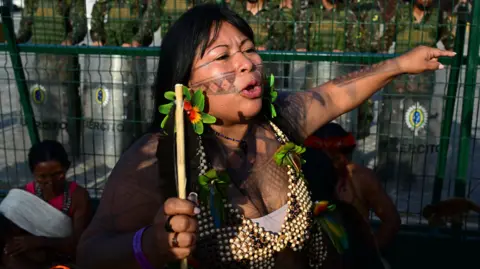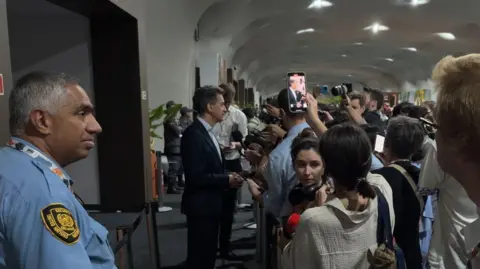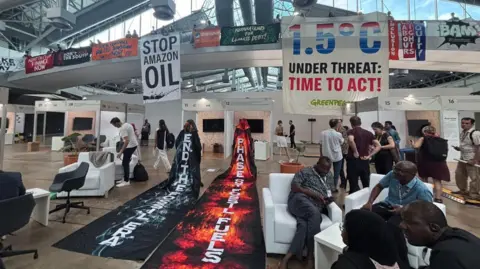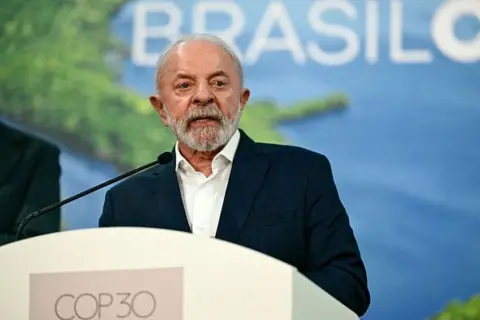Georgina RannardClimate and science correspondent in Belem, Brazil.
 Getty Images
Getty ImagesA row over fossil fuels has erupted at the UN COP30 climate talks in Belem, Brazil, as the meeting draws to a close.
At the heart of the dispute is disagreement over how strong a deal should be to cut the world's use of fossil fuels, whose emissions are by far the biggest driver of climate change.
The dispute pits groups of countries against each other, but all 194 parties must agree to accept an agreement at the two-week summit.
Representatives and observers from the secure meeting room say negotiations have become very difficult.
One negotiator in the room told the BBC there was “a lot of fighting going on.”
Brazilian President Luiz Inacio Lula da Silva and some countries, including Britain, want the summit to commit countries to taking stronger and faster action to reduce their use of fossil fuels.
French Environment Minister Monique Barbue said the deal was being blocked by “oil-producing countries – Russia, India, Saudi Arabia, but many developing countries have joined it.”
The BBC has approached Saudi Arabia for comment.
Speaking to reporters outside the meeting room, Secretary of State for Energy Security and Net Zero Ed Miliband said the UK was committed to keeping the path forward on fossil fuels “live” in the negotiations.
“It's hard, it's sweaty, it's frustrating. There is a big difference of opinion,” he said.
 BBC/Tom Ingham
BBC/Tom Ingham“We are determined that one way or another this innovative idea, with the support of more than 80 countries to develop a roadmap for the transition away from fossil fuels, will be saved at this conference,” he said.
Mr Miliband added: “I think in 10 to 20 years people will say: 'You were the generation that saw the climate crisis all around them.' Have you taken action? Have you accepted the challenge? It's this feeling of what people will think of us in the future that keeps me going.”
Earlier, a group of countries, including the UK, published a letter expressing “deep concern” and rejecting the new draft agreement.
Two years ago, COP28 in Dubai committed countries to “transitioning away from fossil fuels,” but did not commit countries to specific actions or timelines.
The group of more than 80 countries wants COP30 to develop this plan and make stronger commitments to phase out oil, coal and gas.
Ms Barbut suggested small island states could agree to a weaker fossil fuel deal if they received more funding to adapt to changes in their countries caused by rising temperatures.
Of France's position, she said: “At this point, even if we don't have a road map, but at least mention fossil fuels, I think we would accept it. But in its current form we have nothing left.”

In the hallways, groups of activists chant “fossil fuels!” and hanging posters reading “Stop Amazon Oil” and “1.5°C at Risk: Time to Act.”
“A good outcome can mean giving us a future and a present worth fighting for,” International Youth Climate Movement campaigner Shurabe Mercado from Mexico told BBC News.
“Our generation is the most at risk, and we are the most at risk.”
The meeting represents a complex and delicate diplomatic process as countries fight to protect their national interests while also trying to address climate change.
Some observers have questioned the value of complicated legal negotiations, which almost always drag on.
But others point to significant progress in climate action, including renewable energy, electric vehicles and nature protection, in recent years associated with COP agreements.
Other issues discussed at the COP included the shortfall in climate finance promised by richer countries to developing countries hit hardest by climate change.
The new draft agreement calls for a global effort to triple the funding available to countries by 2030.
But it doesn't say whether those funds should come from richer countries or from other sources, such as the private sector.
That could anger poorer countries, which want stronger support from richer countries and sharply criticized the agreement at last year's COP29 in Baku, Azerbaijan, which they saw as petty.
 Getty
GettyDeforestation is also a major problem that occurs on the edge of the Brazilian Amazon.
The new draft agreement weakened previous language addressing deforestation.
“The wildlife and indigenous peoples who call the forest home deserve better,” said Kelly Dent, director of external engagement at World Animal Protection.
The two-week meeting was interrupted by two evacuations.
Last week, a group of protesters stormed the COP building in Belém with signs reading “Our forests are not for sale.”
There was a fire on Thursday. burned a hole in the building's protective covering and caused 13 smoke inhalation injuries. The summit was evacuated and closed for at least six hours.
The summit was praised for having the largest number of indigenous delegates ever.




:quality(85):upscale()/2025/11/14/967/n/49352476/7811c5786917a989e103f8.91070426_.jpg?w=150&resize=150,150&ssl=1)




